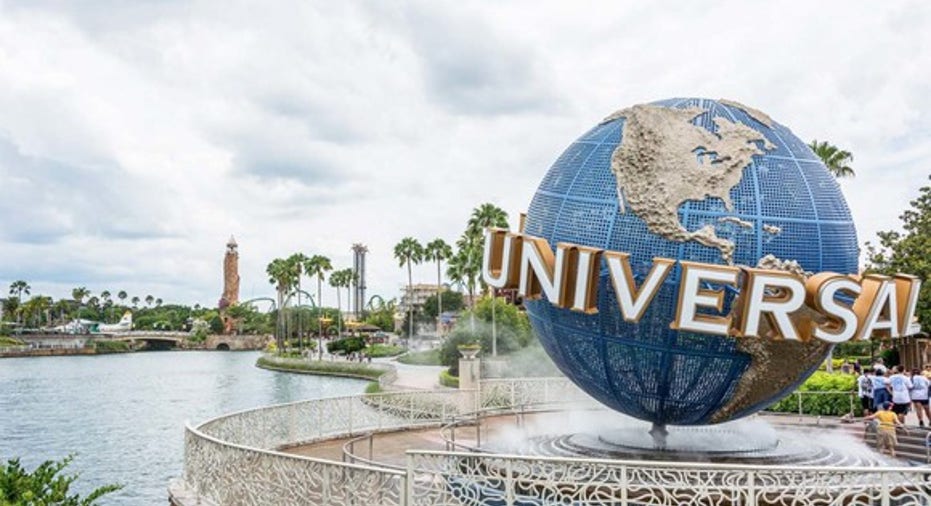Disney World's Biggest Rival Gets Greedy at the Wrong Time

Image source: Universal Orlando.
There's been plenty of buzz this week in the theme park industry surroundingComcast's (NASDAQ: CMCSA) decision tohike annual pass pricesat Universal Orlando. It wasn't a mere token increase. It will now cost between 10% and 13% more to buy an annual pass than it did before Wednesday morning's changes.
Universal Orlando didn't do itself any favors by introducing the entry-level pass under a new name: Seasonal. The old name for the entry-level annual pass with no complimentary parking and blackout dates during the summer and other holiday periods -- Power -- will live on as an enhanced year-round ticket that provides summer access and a 50% discount on parking. The Power Pass itself rose 36% this week, a jarring amount, but it's not a comparable pass anymore. The real increases are 11% for the Power that is now Seasonal, 13% for the Preferred that includes free parking and year-round access, and 10% for the Premier that tacks on complimentary valet parking and access to the Express Pass expedited queues after 4 p.m. every night.
This makes the 10% to 13% increase easier to stomach, though it bears pointing out that the Seasonal option is more restrictive than the original Power pass since it blocks out access to both parks during the summer. The Power only restricted visits to one of them.
It's still a gutsy move at a pretty dangerous time. Universal Orlando has now increased its price passes three times over the past 16 months. Nickel and dime people too often and we're soon talking about a lot more than pocket change.
Scary Potter
Comcast is rolling. Its domestic theme parks are growing faster than any of its publicly traded rivals. It's also making up ground on top dog Disney (NYSE: DIS). Disney World is the most visited resort on the planet, and Magic Kingdom leads the way in attendance. However, Comcast's Universal Orlando has been on fire since opening The Wizarding World of Harry Potter in 2010 and expanding it in 2014. The surge in popularity for Comcast's theme park resort in Florida has been impressive.
Data source: Themed Entertainment Association.
It's not just the spike in turnstile clicks. Universal Orlando has ramped up its infrastructure to satisfy consumer demand. It has more than doubled its on-site hotel rooms since 2014. It is adding new rides and attractions at a dizzying clip, a sharp contrast to Disney that typically moves slowly in building out its parks.
Comcast is doing things right on the buildout of its resort, but that also makes the recent flurry of rate increases a concern. Prices on single-day tickets and annual passes have been on a tear since Potter's arrival. Let's not limit ourselves to this week's mere 10% to 13% uptick.
The original Power pass was $189 until early May of last year. It went to $214.99 at the time, a 14% increase. Five months later it went up 9% to $234.99. In late August -- Wednesday morning, to be exact -- it rose 11% to $259.99 as the new Seasonal pass. That's a $71 or 38% increase in 16 months, and it's an inferior pass given the blackout summer period for both parks now. The Preferred pass has risen 35% or $91 in that time. Premier has gone up 27% or $105 in those 16 months.
Wrong Kong song
This is easy money for Comcast if the crowds hold up. Theme parks are scalable models with high fixed costs and one-time capital expenditures. We've seen both Comcast and Disney consistently grow operating earnings at their theme parks at faster clips than revenue as a result in part of big increases in admission rates. That's great, but what happens if the pendulum starts swinging the other way? We've already seen Disney World post back-to-back quarters of year-over-year declines in attendance. Disney made a similar move to its annual pass structure late last year. Is the lower crowd count a coincidence?
If this week's move is what finally breaks Universal Orlando's torrid growth streak, the ramifications can hurt. It has more than doubled its on-site hotel occupancy. It's building out a small on-site waterpark. It acquired roughly 475 acres of land just outside of its resort. It snapped up DreamWorks Animation in a move that will fortify both its movie studio and its owned theme park properties.
What happens to those rooms or the rates on those rooms if burned pass holders and maxed out day guests have had enough. Test the price elasticity of demand to your peril. It's great for shareholders when it works, but you can't stretch out that rubber band forever.
A secret billion-dollar stock opportunity The world's biggest tech company forgot to show you something, but a few Wall Street analysts and the Fool didn't miss a beat: There's a small company that's powering their brand-new gadgets and the coming revolution in technology. And we think its stock price has nearly unlimited room to run for early in-the-know investors! To be one of them, just click here.
Rick Munarriz owns shares of Walt Disney. The Motley Fool owns shares of and recommends Walt Disney. Try any of our Foolish newsletter services free for 30 days. We Fools may not all hold the same opinions, but we all believe that considering a diverse range of insights makes us better investors. The Motley Fool has a disclosure policy.



















